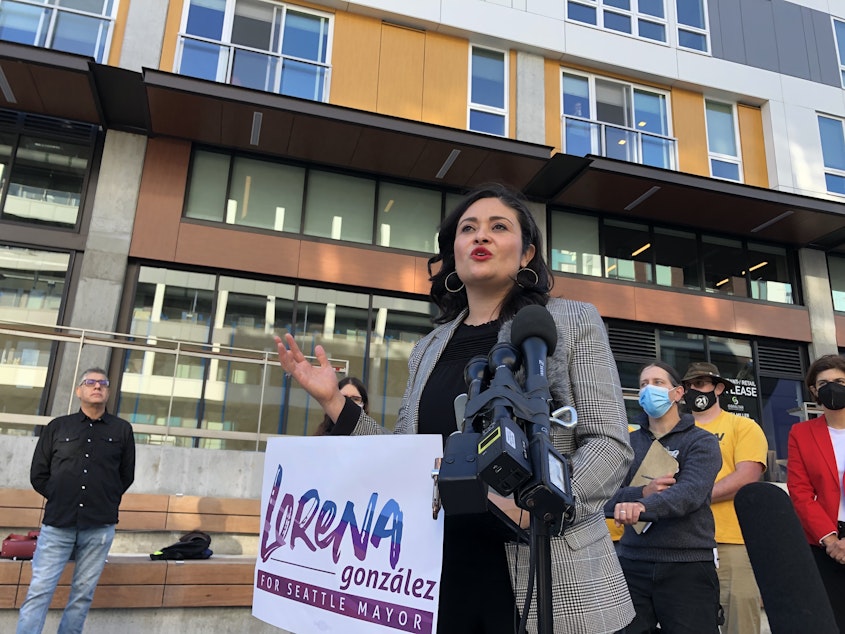González plan for housing favors wealth tax, rejects sweeps

City Council president and candidate for Seattle mayor Lorena González has unveiled her plan to address the city’s housing and homelessness crisis. She proposed new taxes on the wealthy, more flexible zoning, and an array of policies to prevent displacement.
At a press event Thursday, González said if elected mayor, there is one measure she will not employ related to homelessness: “sweeps,” or forcible removals of people living in encampments. Instead she would seek to create housing that draws people to come inside.
“It’s our responsibility to work with our human service providers and with our housing providers to create all of the different options we know people want to say ‘yes’ to,” she said, adding that she’d move to rapidly “assess encampments across all neighborhoods and quickly work with city staff and our community service providers to identity people we can immediately help inside.”
To fund that additional housing, González said she’d seek new taxes on the wealthy.
“We are looking at a sizeable new investment to really truly create the housing that we need that is deeply affordable," she said.
González is also exploring a few potential sources.
Sponsored
“We passed the Jumpstart Seattle payroll tax on city’s largest corporations. I think we have an opportunity to build on the state’s capital gains tax assuming it continues to stay on the books,” she said. “And I think there’s an opportunity to revisit the wealth tax that we passed a few years ago but also create tax credits for working-class families to make sure it truly is progressive.”
González said she’d also offer renter protections, more affordable childcare and a universal basic income program in order to prevent people from getting priced out of Seattle. She also said she’d seek to improve pay and conditions for caseworkers who provide outreach, to stem the high turnover rates.
Arianna Loreano spoke in support of González’ plan. Loreano said she is disabled and became homeless in Seattle. She’s now housed but paying 60% of her income in rent.
“Without shelter and safety, people like myself cannot recover from the suffering of being without a home,” Loreano said.
Coté Soerens, the co-owner of Resistencia Coffee in Seattle’s South Park neighborhood, also spoke Thursday and said she likes that González’s plan to address homelessness is so comprehensive.
Sponsored
“We can’t keep looking for solutions that will just make it more comfortable for us, by just sweeping everything out of our sight, knowing that our neighbors are struggling,” Soerens said.
Single-family zoning
Another facet of González’s proposal would be to revamp single-family zoning in the city’s next comprehensive plan in 2024.
“We should make sure more homes of all shapes and sizes are available for our neighbors. We need to re-legalize housing like duplexes, triplexes and other lower-cost homes across Seattle,” she said.
Doug Trumm is the executive director of The Urbanist, a publication that advocates on issues such as density and transit. He said González’s position on zoning earned their endorsement.
Sponsored
“Such a policy would help in a lot of ways,” he said. “One of the immediate ways would be that our affordable housing providers would have more places where they could actually build housing.”
González’s opponent, former Councilmember Bruce Harrell, also described his homelessness plan earlier this month. If elected, Harrell pledges to build 2,000 new units of supportive housing in his first year while moving to clear encampments from public spaces.
González counters that sweeps are not a remedy, and she called his pledge to build that many units “wishful thinking.” She said in 2020, Seattle built the most new units ever, at 600.
In a statement, Harrell accused González of making “vague promises of new revenue.” He called the 2,000 units “ambitious, but needed goals” and said he wants to make “parks and sidewalks safe and welcoming for all the people of Seattle."
Harrell's full statement:
"Since day one of this campaign, I have made clear that I will bring needed leadership – and accountability – to this crisis, including ambitious but needed goals for 2,000 units of supportive housing, expanded emergency rental assistance to prevent homelessness, and resources to clean and restore parks and open spaces. The status quo approach offered today isn't working – people are suffering for lack of action in City Hall. Soundbites and vague promises of new revenue will not help people get housing and support right now, and will not make parks and sidewalks safe and welcoming for all the people of Seattle."'
The City Council is expected to vote on some of the renter protections González supports on Monday: proposals to require six months’ notice of rent increases, and for landlords to pay moving costs if a tenant vacates the rental due to a rate increase.




